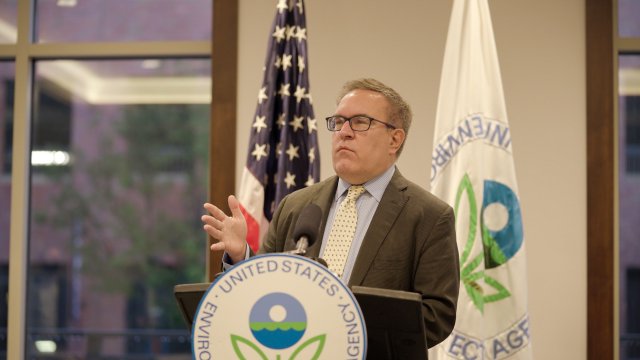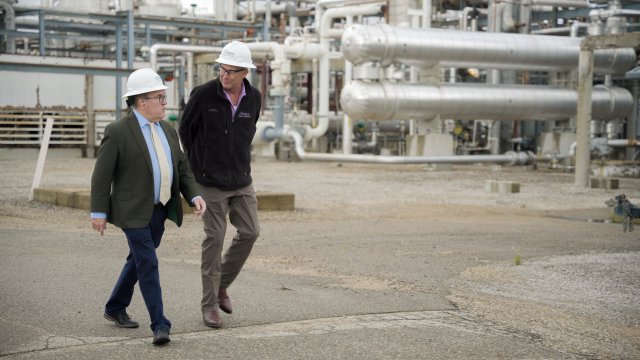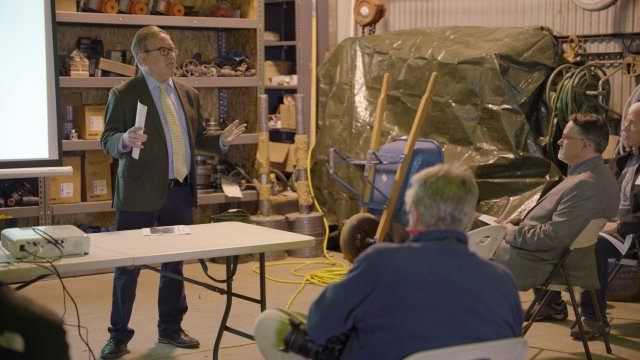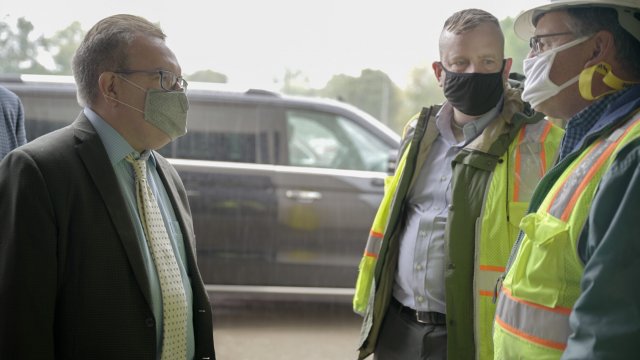Administrator Wheeler Wraps Up Midwest Swing in Michigan
East Lansing, Mich. (September 30, 2020) — Today, U.S. Environmental Protection Agency (EPA) Administrator Andrew Wheeler wrapped up his Midwest Swing in the State of Michigan making a series of announcements on water infrastructure investment, Great Lakes protection, and environmental justice.
“EPA’s new focus on community-driven environmentalism is perhaps the best opportunity in a generation to help promote environmental justice for communities suffering from legacy pollution, aging water infrastructure and water pollution – especially along Michigan’s Great Lakes,” said EPA Administrator Andrew Wheeler. “These awards will make a real difference in the environmental health of communities in Michigan and ultimately in the lives of Michigan residents.”
“This administration recognizes the Great Lakes are a national treasure, and has made the protection, restoration and long-term health of the lakes a priority here at EPA,” said Region 5 Administrator and Great Lakes National Program Manager Kurt Thiede. “We are always stronger when we are working together, and these grants are reflective of our commitment to continuing this important work with our partners across the region, and to engage with new partners who have demonstrated a shared dedication to preserving and protecting our environment.”
In Traverse City, Mich., Administrator Wheeler announced that applicants will be able to compete for $5 million in funding for Trash Free Water (TFW) grants under the Great Lakes Restoration Initiative (GLRI). The trash-free water projects EPA selects will support the larger effort to restore and protect the Great Lakes through the GLRI. This additional funding will support Great Lakes trash-free water projects that use mechanical devices, vessels, and other technology for cleaning-up and protecting our Great Lakes harbors and waterfronts from trash.
“Ensuring our Great Lakes are clean so future generations can use and enjoy these treasured natural resources is at the very heart of the Great Lakes Restoration Initiative, and is another example of why I continue to fight for this program,” said U.S. Congressman Jack Bergman (MI-01). “I’m thankful Administrator Wheeler has helped make the Great Lakes Trash Free Waters program a priority. Working together with local partners these projects will remain an important step to keeping our waters clean.”
“Preserving and protecting the beauty of the Great Lakes remains a priority for me and so many Michiganders who are proud to call the Great Lakes State home. Bottom line – don’t mess with the Great Lakes,” said U.S. Congressman Fred Upton (MI-06). “This federal grant program will be critical to keeping our lakes clean for generations to come.”
The first-ever round of Trash Free Great Lakes grants were awarded to seven grantees in the summer and fall of 2020 totaling $2,083,860. In April, EPA announced that $2 million in GLRI funds would be used for additional TFW grants. Because of EPA’s focus on addressing trash in the Great Lakes ecosystem, EPA is supplementing that $2 million commitment with an additional $3 million, totaling the $5 million announced earlier today.
While in Traverse City with Michigan House Majority Leader Triston Cole (MI-105), Administrator Wheeler announced the selection of the Michigan Department of Environment, Great Lakes, and Energy to receive $200,000 to promote community health initiatives in Southwest Detroit that also help address challenges with COVID-19.
EPA has been actively supporting COVID-19 response efforts across the country to protect public health. As part of these efforts, EPA is providing $2 million in State Environmental Justice Cooperative Agreement (SEJCA) grant funding to states, local governments and tribes for projects to benefit low income and minority communities disproportionately impacted by the global pandemic. Funding will be provided once all legal and administrative requirements are satisfied.
While in the mitten, Administrator Wheeler and Regional Administrator Thiede met with the Michigan Oil and Gas Association for a tour of the Lambda Energy Resources wet gas facility, and a discussion on the state’s regulatory programs.
During the last stop in Michigan, Administrator Wheeler highlighted significant EPA investment in the state of Michigan’s water infrastructure and drinking water quality. In 2020, EPA provided Michigan $95,358,000 for its Clean Water and Drinking Water State Revolving Funds to finance clean water infrastructure and drinking water projects in communities across the state.
“The $95 million in clean water funding for Michigan announced today by the Trump Administration will help protect our state’s lakes, rivers, and streams,” said U.S. Congressman John Moolenaar (MI-04). “As Michigan’s senior member of the Appropriations Committee, I have been working in Congress to make sure the federal government supports vital investment in Michigan’s water infrastructure so our cities and rural communities can provide safe water for residents.”
“Ensuring every Michigander has access to safe, clean drinking water is a must. This funding to finance critical infrastructure and drinking water projects in communities across Michigan will help in our mission of protecting drinking water for our kids, our families, and our communities,” said U.S. Congressman Fred Upton (MI-06).
“This federal funding is a significant investment in Michigan’s drinking water systems, quality of life, and long-term economic growth,” said U.S. Congressman Tim Walberg (MI-07). “Modernizing our water infrastructure will help create a healthier future for communities across our state, and I am grateful to Administrator Wheeler and EPA for their continued partnership in support of this effort.”
He also highlighted the recent $681,000 grant to Michigan for voluntary testing for lead contamination in drinking water at schools and childcare programs under the Water Infrastructure Improvements of the Nation (WIIN) Act.
Earlier this week, Administrator Wheeler highlighted Brownfields in St. Cloud, Minn. driving economic revitalization, met with and listened to agricultural stakeholders in Stanchfield, Minn., and announced more than $73 million in grants for clean diesel projects and $4.1 million in environmental justice grants.




